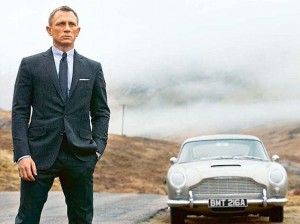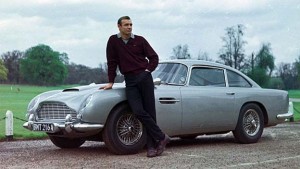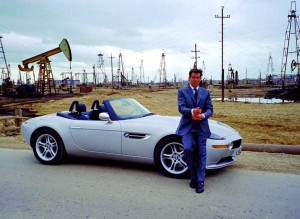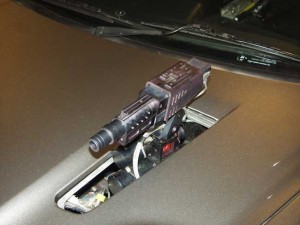As that well known “secret” agent James Bond gets ready to celebrate his 50th anniversary on the silver screen with today’s nationwide opening of “Skyfall,” a look back reveals that some things never change. When 007 is on the prowl you know there will be worthy villains, trick gadgets, plenty of babes, booze and, of course, an assortment of hot cars.
Actually, over the last century, Bond, James Bond, has found himself behind the wheel of a fire engine, a moon buggy, a Russian tank and has even taken the stick of a Bede BD-5 microjet. But it’s the cars that catch our eye, including some of the most lavish and exotic you can imagine, like a Lotus Esprit and a Rolls-Royce Phantom.
He’s also been stuck in less luxurious rides over the decades. In fact, the very first car we saw 007 drive in a movie was a Chevrolet Bel Air convertible – in the venerable franchise’s original film, “Dr. No.” He’s had to settle for a Ford Galaxie 500 and even an AMC Hornet X – which performed a notorious bridge jump in 1974’s “The Man with the Golden Gun.”
But the brand most often associated with the British spy is, appropriately enough, veddy, veddy British itself, an Aston Martin. The marque makes its first appearance in Sean Connery’s third film, “Goldfinger,” when he leads chase in a classic DB5. In fact, that car, with license plate BMT 216A, is the rare character to make a repeat performance, showing up in six films including – spoiler alert – the latest, “Skyfall.”
Curiously, that wasn’t what Ian Fleming had in mind. The former secret agent’s series of thrillers found the hero a fan of another U.K. marque, the even more exclusive Bentley. It was described in the original 1953 novel as Bond’s “only personal hobby,” Fleming suggesting the spy liked to drive it “hard and well and with an almost sensual pleasure.”
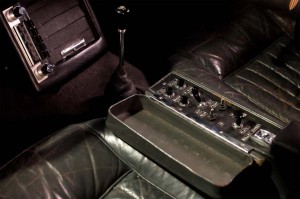
Any number of gadgets, such as the machine guns and oil slick generator, were at Bond's fingertips. The ejector seat was triggered by a button atop the gearshift lever.
Himself a former Navy intelligence officer, Fleming described several different Bentleys in the books, among them, a supercharged 4-1/2 litre “blower” Bentley, of which just 55 were made. It was readily recognizable due to the gun metal supercharger that stuck out of its nose. That car made its appearance in the original book, Casino Royale but was ultimately destroyed in the third, “Moonraker.”
And for those who think that the only damage a journalist can achieve is with a pointed review, that rare Bentley was crushed beneath some giant rolls of newsprint.
Fleming did put Bond in an Aston, an earlier DB III, in the book version of Goldfinger. He pulled it out of the MI6 pool, however, to better look the part of a well-heeled gentleman when going to play golf with the villain. As was more common than not, this shows just how details were changed when Fleming’s books were put to film.
The first Sean Connery films were shot on a budget. Few expected the 007 films to be nearly so successful – never mind continuing to run for 50 years and counting. So, it’s probably no surprise the filmmakers grabbed anything they could get their hands on. But as it became clear that Commander Bond had transcended the silver screen to become a legend of popular culture, automakers suddenly started knocking on the door of producer Cubby Broccoli.
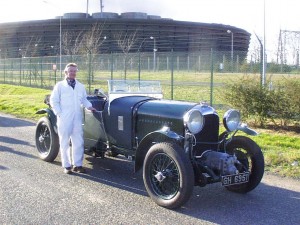
According to Fleming's novel, Bond's Bentley was his "only personal hobby," giving him an "almost sensual pleasure." He owned a "Blower" Bentley like this one.
Film industry legend has it that Aston wound up besting its British rival because it was willing to pay for placement in the Bond movies. Bentley, on the other hand, somehow had the conception that super spies, like mere mortals, weren’t about to get a free ride.
Aston, however, wasn’t the only automaker willing to pay up. For the 1965 “Goldfinger,” Ford provided a Lincoln Continental convertible to be crushed in a compactor in order to have the director work in a scene with the then brand new Mustang. The pony car was wrecked, incidentally, when Bond used the wheel-cutting blades on his Aston.
As the series’ success grew, the placement deals grew far more lavish – and expensive – eventually running into the millions of dollars in cash and other payments. In the 1990s, Ford saw the Bond films as a great way to promote its assortment of luxury brands, many of them British — including Jaguar, Land Rover and, of course, Aston Martin. But it was required, among other things, to heavily promote the films in its own advertising.
“The Broccolis were good to work with,” recalls Ford marketing executive Samantha Hoyt, who handled the negotiations with the producers. But, she quickly adds, “They were tough negotiators (who) really believed in the value of their franchise. They expect a lot from their partners, but the films deliver. Looking back, it was worth the investment and it gave us six months of global coverage as the film launched around the world.”
Perhaps, it’s no wonder that Aston briefly found itself vanquished when the German maker, BMW suddenly decided to bid for the Bond franchise. That brand made its debut in 1995’s “Goldeneye,” and the entire placement deal seemed to have hinged around using the movie to give the world its first look at the all-new BMW Z3 roadster. Ironically, it only appeared briefly, and near the end, when 007 squeezes in a short, slow drive before handing the car over to American agent Jack Wade.
BMW continued to be the go-to brand for several more films, with models including the 750iL and the Z8 helping Bond give chase.
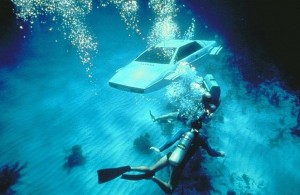
One of the more creative Bond cars was a Lotus Esprit that could transform instantly into a submarine.
Of course, simply having a fast and sexy car isn’t always enough for a globe-trotting superspy. And that’s where Q comes in. The eccentric quartermaster – long the role of actor Desmond Llewelyn — has always been a master of technology. The original Aston Martin DB5 incorporated such useful “modifications,” in his words, as a car phone and pre-GPS navigation and tracking capabilities.
In fact, its gadgetry changed for each film, at various times including pop-out gun barrels, a bullet-proof shield, retractable, tire-slashing blades, rocket launchers, an oil slick generator, a revolving license plate, and the famous ejection seat.
In its early form, the DB5 was custom-outfitted by John Stears, a Hollywood special effects legend with two Oscars to his credit, one for “Thunderball,” the other for “Star Wars.”
(And as an aside, Ohio car collector Harry Yeaggy paid a hefty $4.6 million to purchase the original Aston at an October 2010 RM Auction. That was less than many had expected it to go for. But, then again, it had previously spent 41 years in the collection of Philadelphia radio broadcaster Jerry Lee – who snapped it up for a mere $12,000 in 1969 after MGM finished using it for a promotional tour.)
As spectacular as all those modifications might appear, each film seemed desperate to outdo the previous one. By the time the series was set for a reboot, with Piere Brosnan’s final – and poorly reviewed – “Die Another Day,” Q had come up with a car that could ski, one that turned into a submarine and another that could become invisible.
And, in an homage to the early films, a new Aston Martin V12 Vanquish was also outfitted with an ejection seat – but here it served to help Brosnan’s Bond flip the car back over after it landed on its roof.
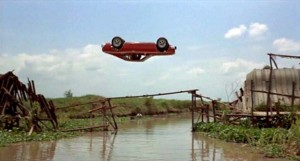
One of the most famous of all the Bond stunts was this river jump by, of all things, an AMC Hornet in The Man With the Golden Gun.
A list of all the various cars 007 has driven over the years would fill many more pages and includes a handful of Jeeps, a Sunbeam Alpine, at least one Mercedes-Benz and an assortment of Jaguars and Land Rovers, especially since Daniel Craig’s Bond reboot.
But, (Spoiler Alert) as “Skyfall” makes it clear, it’s the Aston Martin DB5 that seems most closely associated with 007. Will the DB5 show up in another one of the spy’s adventures? We’ve learned never to rule things out. James Bond will prove again an ability to return from the grave in this newest feature. But it could be just a little bit more difficult for the long-running Aston. We’ll leave it for you to find out why.
Oh, and for the truly dedicated Bond-ophiles, if “Skyfall” just whets your appetite, consider a visit to the National Motor Museum in Beaulieu, England, a couple hours out of London. Through January 6, 2013 they’ll have 50 of the best-known Bond cars on display.

